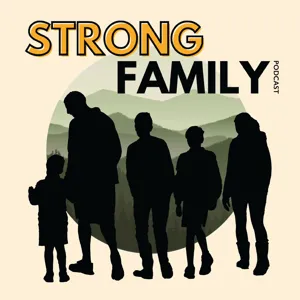Welcome to The Strong Family Project with Joe and Mell, joined by a very special guest, Amy from Raising Healthy Kid Brains! In this enlightening episode, we explore the fascinating journey of Amy, a mother of 5 and the founder of an international education company for kids. Amy takes us back to her unique upbringing as one of 12 children and shares stories of being educated at home by her incredible mother.
Discover the inspiring tales of hard work on their land, canning their own food, and the remarkable way her mother made it all fun. Amy opens up about her concept of "side schooling," a powerful approach to support a child's classical education while embracing child-led learning practices within the comfort of home.
Join us as we delve into the secrets of Amy's upbringing and her passion for nurturing healthy kid brains. Learn how to create an engaging and enriching learning environment for your children, blending traditional education with child-led exploration. Amy's insights will inspire you to foster a love for learning and empower your children to thrive academically and creatively.
Don't miss this captivating episode of The Strong Family Project. Tune in now to gain invaluable wisdom from Amy, Joe, and Mell on cultivating a holistic educational experience that supports your child's growth and development.
Subscribe to The Strong Family Project on YouTube for more inspiring episodes: https://www.youtube.com/@strongfamilyco
Follow us on Instagram: https://www.instagram.com/officialstrongfamilyco/
More from Amy and Raising Healthy Kid Brains: https://planningplaytime.com/podcast/
Get ready to embark on a journey of educational discovery and empower your child's learning potential. Hit that play button and let's dive in!
Get the full 7 Elements of the Strong Family Path free at https://strongfamilyproject.com/strong-family-path/
Follow on YouTube: https://www.youtube.com/@strongfamilyco
And join the Instagram Strong Fam: https://www.instagram.com/officialstrongfamilyco/
Email Us: strongfamilyco@gmail.com with comments, questions, media inquiries or brand advertising (to save time, better listen to some Strong Family episodes first and are aligned with our message!)
We hope that you found this episode of the Strong Family Project Podcast helpful and informative. If you enjoyed this episode, please consider leaving us a review or a comment on your favorite podcast platform. Your feedback helps us to continue creating valuable content for our listeners and to reach more families who could benefit from our message. Thank you for tuning in and for being a part of the Strong Family Project community!

